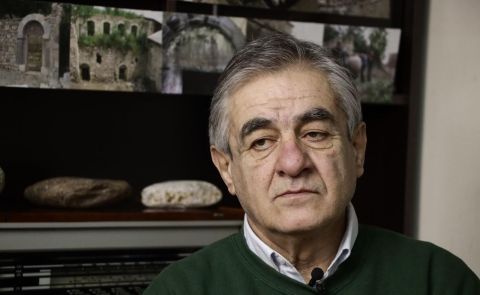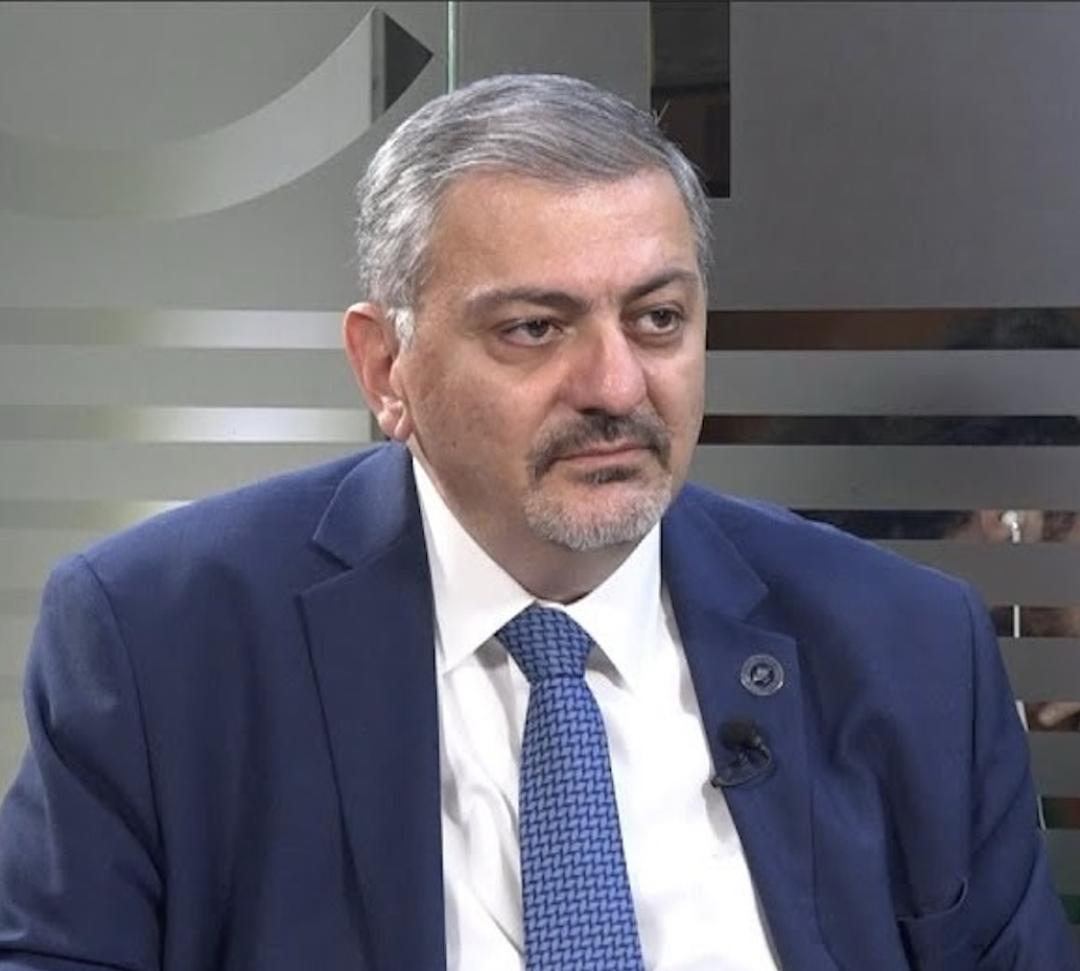
Vache Gabrielyan: The Environment Does Not Feature in Our Talks with Baku

The bilateral negotiation between Armenia and Azerbaijan raises a number of questions with economic significance, sometimes with environmental consequences. Transport, trade, and water resource management are being discussed on the “sidelines” of a broader bilateral negotiation between Yerevan and Baku, which includes border delimitation and a peace treaty. To understand the economic side of this story, we turn to Dr. Vache Gabrielyan, former Deputy Prime Minister, Minister of Finance, Vice-Governor of the Central Bank of Armenia, and Dean of the Manoogian Simone School of Business and Economics at the American University of Armenia.
Are “regional cooperation” and “national security” mutually exclusive? I am thinking particularly of negotiations for the opening of the border with Türkiye.
They are not mutually exclusive, at least in theory, and in some cases, like in Europe, they also work quite successfully in practice. Generally, if the major regional powers are interested in regional cooperation, they create conditions that smaller players can also benefit from. For this to work, the initiative should come from the stronger party.
As for the situation with Türkiye, it should be recalled that the borders were never really closed from the Armenian side (except for a very brief period during the war); they were, and are, closed on the Turkish side.
Of course, there is at least a question about agricultural goods flooding the market (which are subsidized by Türkiye) and the extent to which this market distortion would be detrimental to local producers if these subsidized goods enter the Armenian market.
If current regulations persist, that should not be a major concern, as it will not be straightforward trade. There are different customs regimes on either side of the border, as Armenia is a member of the Eurasian Economic Union, while Türkiye is a party to the European Union–Türkiye Customs Union. As such, there is no freedom of movement of goods as yet. So, there are customs barriers, as the two blocs are not confluent. The assumption that we could be immediately flooded with goods is not entirely well-founded.
Armenia and Azerbaijan are invested in the mining and agricultural sectors, which are water-intensive. We are months away from COP29 in Baku. To what extent is this an opportunity to address regional challenges? Is there scope for healthy regional debate, or are scarce water resources the next front in this conflict?
There may be developments that I am not aware of, but there is no regional platform for the discussion of water resources. For such talks to work, they would most likely have to be sponsored by a stronger regional actor. That does not seem to be a priority for any of the regional powers.
The need to engage is there. Türkiye, Iran, Azerbaijan, and Armenia should be engaged in a discussion on the management of the Aras River and its tributaries. But there is no platform to negotiate this. To the best of my knowledge, we still do not have a platform of this kind.
We still have a regulatory framework dating back to the Soviet Union. This agenda is not a priority for either Türkiye or Azerbaijan. Iran is cooperating with both Armenia and Azerbaijan. On the day of the fateful accident, the late President of Iran (Raisi) was visiting a joint water project on the border with Azerbaijan. Tehran remains interested but does not take the lead on the regionalization of the water agenda.
There is always an objective scope for healthy regional discussion, especially about water resource management. Unfortunately, there is no such discourse. Usually, transborder water resource management or pollution issues arise when a state is engaged in a project funded by an International Financial Institution. In this case, parties need to meet international benchmarks of environmental sustainability, which requires transboundary discussion. These consultations are more often focused on a singular project and have a limited scope, usually resolved within the bureaucratic ecosystem of the IFIs rather than through political initiatives aimed at creating a framework to bolster the resilience of local ecosystems and promote a unified vision for regional water resource management.
As for the absence of environmental debate, it seems that Azerbaijan (with Türkiye) is currently more motivated by securing symbolic and material concessions from Armenia. Any cooperation agenda with Armenia is deemed secondary in importance, and its timing is seen as inopportune. Armenia is not yet able to influence this agenda. Given the current stance of the parties, COP29 is not going to be a game-changer. At most, it may thwart or postpone a possible military skirmish, but the meeting does not have the security or financial leverage to induce cooperation.
Yerevan has articulated the "Crossroads of Peace" vision of regional cooperation in transport and logistics. To what extent is this a realistic prospect? How would investment in national infrastructure be financed: private equity, the national budget, multilateral banks, or foreign investors? Is there realistic scope to engage actors beyond the "3+3" diplomatic framework?
Currently, this is more of an Armenian vision rather than a regional one. No one objects to it vehemently, but there are no sponsors outside Armenia—whether corporate or state actors—that I am aware of. Furthermore, this initiative is not granular in its detail. To the best of my knowledge, the project is not yet accompanied by a feasibility study, and there is no distinct pot of money allocated to fund it.
The scope of the project is not overwhelming in the long run. One could make a case to get the project started, beginning to implement aspects of it with a scalable vision, but that is not where we are.
Before assessing the realistic economic foundation of this project, there is the question of political feasibility. The proposed vision has yet to gain traction with neighboring states, and "3+3" remains more of a concept than an established framework. If the "Crossroads of Peace" vision were to gain political traction, national governments and International Financial Institutions could rally behind it. There are possibilities for Public-Private Partnerships as well, but only if our neighbors buy into this vision. The main question is one of political feasibility.
The "3+3" diplomatic framework frames increasingly closer economic cooperation between Türkiye, Russia, Iran, Georgia, and Azerbaijan. The International North-South Corridor is one of the most discussed dimensions of this emerging reality. What is Armenia's role in this framework?
All these countries have different agendas, making leadership difficult. As mentioned above, "3+3" is a concept rather than an established framework, and Armenia is not blocking its emergence as a forum. Armenia has expressed interest in the North-South corridor, but different people understand different things under this term. If we consider the Russia-Iran axis alone, there is limited scope for Armenian engagement, as the main connecting routes transit mostly through Azerbaijan. However, if we think of a wider connection from the Gulf to the Black Sea, Armenia could play a larger role in connectivity, though perhaps not a greater political one.
After the war in Ukraine, the influence of the Eurasian Customs Union is expanding. Can Russia match its leadership role in regional trade with sufficient security guarantees? For instance, can a Syunik-Aras transport corridor exist without a regional conflict?
Clearly, security and trade consolidation are tied together. There is no need for perfect alignment between states. Certain arrangements could work to streamline cooperation. Even if we entertain the idea of a "corridor" resembling the envisaged "Zangezur Corridor," Baku has not spelled out what this proposal entails in practice. We do not know the customs regime envisioned. We do not know what Azerbaijan’s envisioned extraterritoriality means in practice, except for Armenia’s de facto partition, which is not acceptable.
As for Russia taking over security, that seems to be Moscow’s eventual goal: Armenia being part of the Eurasian Customs Union, Iran actively using the Free Trade Agreement with the Eurasian Economic Union, and Russia providing a security umbrella across the region, both from East to West and North to South. Theoretically, this may yet be on the agenda, but not before the war in Ukraine ends.
Interview conducted by Ilya Roubanis
See Also


Irina Mamulashvili: Electoral Interference is a Playbook, not a Recipe

Giorgi Gakharia: The EU Should Engage Georgia Despite Its Democratic Backsliding

Peace or Capitulation? Shahverdyan on Armenia-Azerbaijan Agreement and the Nagorno-Karabakh Crisis

Ali Mousavi Khalkhali: Iran Will Avoid Conflict in the Caucasus

